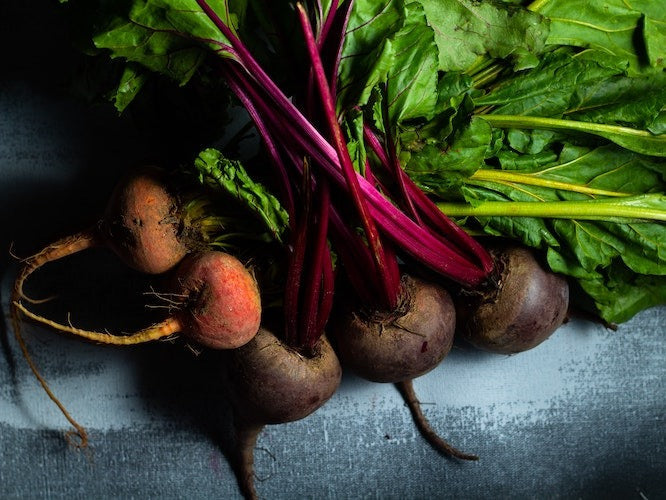Over recent years, athletes and health experts have been singing the praises of beetroot and its ability to enhance performance, reduce muscle soreness, and boost endurance. But what else does it do, how much should you take, and are there any side effects? In this ultimate guide to beetroot, we’re sharing everything you want to know about this health-boosting root vegetable, and why you may want to consider adding it to your supplement routine.
What is beetroot?
Beetroot is a root vegetable most known for its sweet, earthy flavor and bright, vibrant color. Loaded with vitamins, minerals, and energy-boosting nutrients (like nitrates), beets can be a great option to include in your culinary adventures and supplement routine.
Science-backed beetroot benefits

Enhanced endurance and performance
Nitrates are a compound that can improve the efficiency of mitochondria, the energy-producing “power plants'' in cells. While nitrates are naturally found in some vegetables, dairy products, and meat, beets contain a high amount of this compound, which might contribute to their ability to help enhance endurance and boost performance [1,2]. Studies also show that beetroot may increase stamina in endurance athletes, strengthen muscle contraction, and boost oxygen use [3].

Boost cardiovascular health
Research shows that nitrate supplementation in the form of beetroot juice may lower blood pressure and support heart health [4,5]. Additionally, it’s suggested that vitamin C may enhance beetroot’s cardiovascular effects, especially for those with coronary artery disease [6].
Improved digestion
Along with nitrates, beetroot is also rich in dietary fiber, a nutrient that positively affects the rate of digestion of foods, nutrient absorption, and the movement of stool through the colon. In addition to improved digestion, studies continue to show that fiber has other health benefits, including improved blood sugar levels, weight management, and better cholesterol levels [7,8].
While you can find fiber in whole grains, berries, nuts, and avocados, it turns out that one cup of beetroot contains 3.8 grams of fiber, roughly 20% and 13% of the daily value for women and men, respectively. It’s recommended for women to eat at least 21 - 25 g of fiber/day, while men should aim for 30 - 38 g/day [8,9].

Improved glycemic control
Emerging evidence shows that raw red beetroot consumption may significantly decrease fasting blood sugar levels, HbA1c, homocysteine, and blood pressure levels [10]. Moreover, studies have found that people who consistently consume beetroot juice may experience a postponed glycemic response and decreased blood glucose peak compared to those who don’t drink beetroot juice often [11].
Beetroot benefits for men
May improve testosterone. Studies show that beetroot may increase the hormonal response of cortisol and testosterone, but more research is needed to support this [12].
May protect against prostate cancer. Research has found that beet extracts might have important anti-cancer effects against prostate cancer cells [13].
Beetroot powder vs. beetroot supplement: is there a difference?
Beetroot powder is one form of beetroot supplement. Other forms of beetroot supplements include beetroot capsules and beetroot juice. You can enjoy beetroot powder by adding it to a variety of foods, including smoothies, juices, or soups. Interestingly, experts say that a teaspoon of beetroot powder has a similar nutrition profile to one whole, raw beet [14].
Some beetroot powder benefits include reduced inflammation, better athletic performance, reduced post-exercise muscle soreness, and protective liver and kidney functions [15].
How much beetroot powder per day?
Some products recommend 3–6 g of beetroot powder, while others suggest taking 2–3 teaspoons [15]. If you choose to take beetroot powder, be sure to follow the dosing instructions as listed on the product label.
Get beetroot in Elo Smart Gummies
If you’re not into the powdered option, you can also take a beetroot supplement, which you can find in capsule form or as a layer in Elo Smart Gummies.
Elo Smart Gummies are personalized, 7-layer daily gummy supplements that are 3D-printed to match your unique needs based on your health goals, dietary preferences, and biomarkers. Elo matches your unique nutrition profile with the latest clinical research to build a gummy custom-made for you.
Elo Smart Gummies deliver essential vitamins and minerals and incorporate health-boosting functional ingredients (such as beetroot) to optimize health and streamline your daily supplementation routine. They are also vegan, allergen-free, and added sugar-free.
Who should avoid beetroot?
You should avoid beetroot if you have a high risk of kidney stones, have low blood pressure, or are currently taking blood pressure medication [16].
Talk with a healthcare provider before adding beetroot to your routine.
Summary
Beetroot is a root vegetable most often known for its ability to reduce muscle soreness and boost athletic performance. However, evidence also suggests it may improve blood sugar, heart health, digestion, and testosterone.
You can find beetroot in powder, capsule, or juice form, as well as certain supplements like Elo Smart Gummies. Elo Smart Gummies are comprised of seven layers with a unique combination of vitamins and minerals specially designed to optimize your health and streamline your daily supplementation routine.
While there are many benefits to adding beetroot to your supplement routine, it’s recommended that those with a high risk of kidney stones, have low blood pressure, or are currently taking blood pressure medication should not take this supplement. Talk with your healthcare provider before adding beetroot into your supplement routine.
Disclaimer: The text, images, videos, and other media on this page are provided for informational purposes only and are not intended to treat, diagnose or replace personalized medical care.


Share:
The ultimate guide to white kidney bean extract
The best rock climbing supplements for performance and recovery